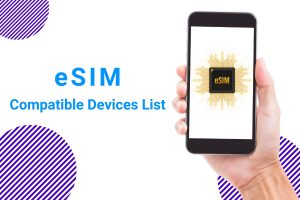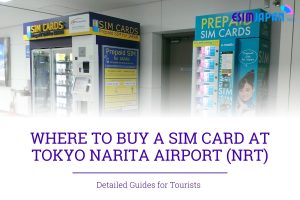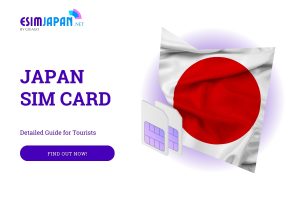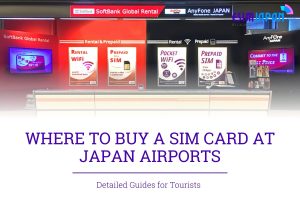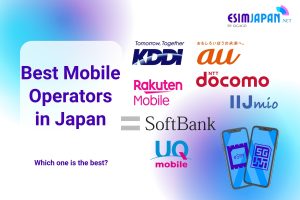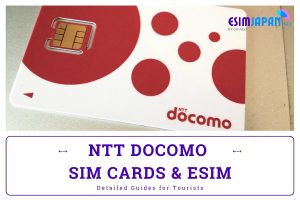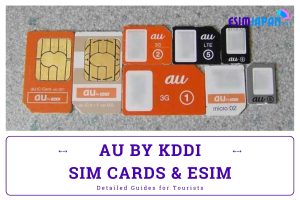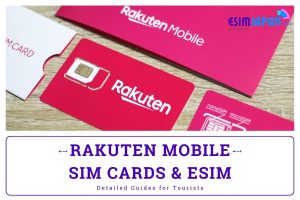Japan has a very fast and reliable cellphone network for accessing the internet. There are many options for tourists to have mobile internet in Japan while visiting. With so many choices, it can be hard to pick the best one. This article gives details on cellphone internet in Japan. It talks about what internet is available where, speeds, prices, top companies, and other things to think about when picking which mobile internet to use during your trip.
Table of Contents
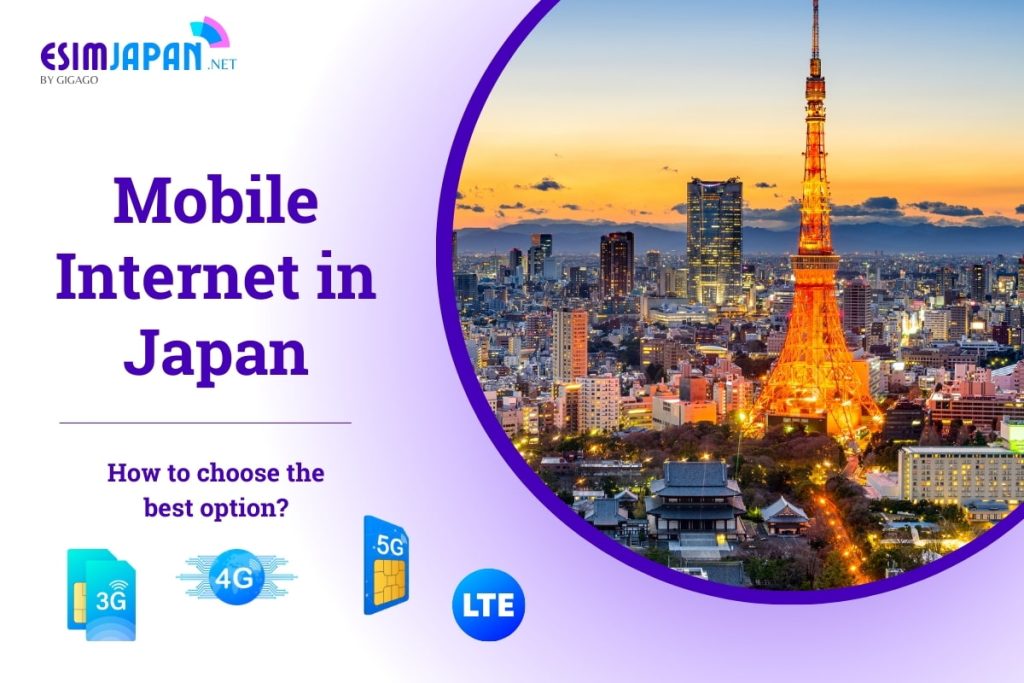
I. Mobile Internet Coverage and Speed in Japan
Ranked among the top globally for both coverage and connectivity speed, Japan’s major carriers have invested heavily to deliver fast, reliable mobile internet in Japan to residents and visitors.
1. Japan Mobile Internet Coverage
While Japanese users generally enjoy strong signal availability, operators are still working to eliminate gaps in mobile service, especially in more remote regions. Satellite connectivity presents a potential solution to fill in these coverage gaps. Here is an analysis of the coverage of each major mobile operator in Japan based on the Opensignal report on October 2024:
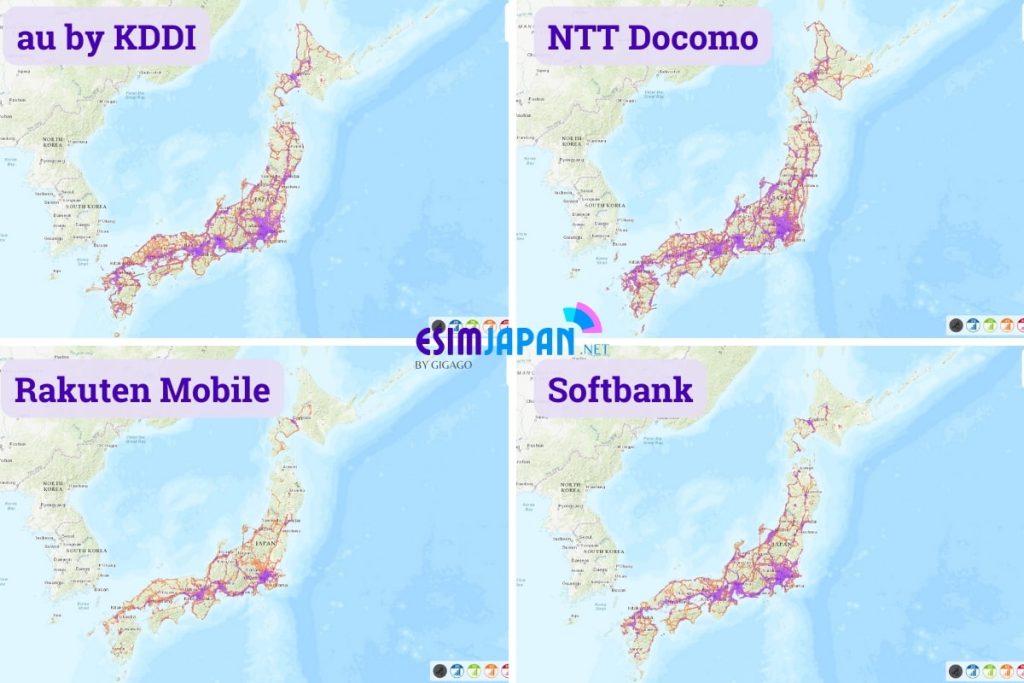
- NTT Docomo: Outstanding coverage – sole winner of Coverage Experience and 5G Coverage Experience awards. Highest availability at 99.7%
- au: Excellent coverage – second place for Coverage Experience. Strong 5G coverage also ranks in second place.
- SoftBank: Fourth place for Coverage Experience award. Third place for 5G coverage and second highest availability.
- Rakuten Mobile: Very good coverage but third place for Coverage Experience. Fourth place for 5G Coverage Experience.
In summary, all four major operators provide extensive nationwide coverage according to Opensignal, with NTT DoCoMo leading on the breadth of 5G while Rakuten Mobile continues expanding its coverage footprint.
2. Japan Mobile Internet Speed
Japan’s cellphone internet speeds tell an interesting tale. The country has some of the fastest mobile speeds worldwide, especially in big cities. But rural areas are often much slower. Let’s look at the details from Speedtest’s rankings:
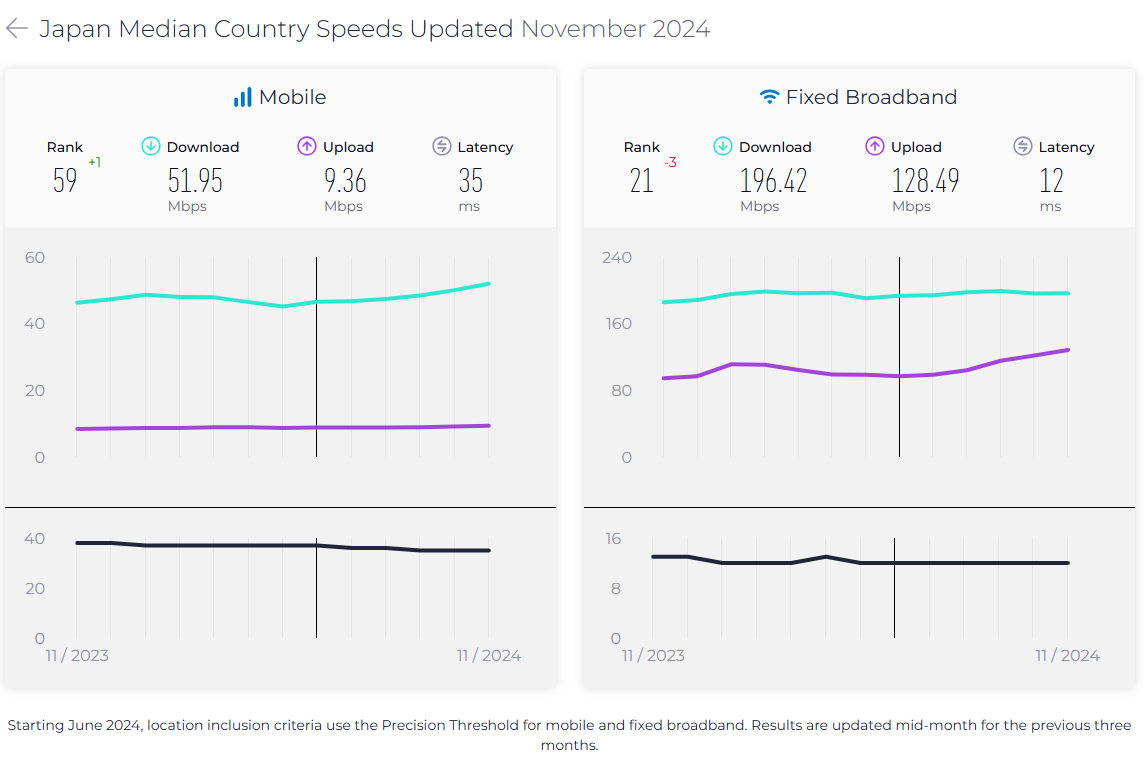
National Ranking:
- Overall: Japan ranks 59th worldwide for cellphone download speed. The average speed is 51.95Mbps. This puts Japan at the top level for mobile internet around the world.
- Compared to nearby countries: Japan has faster speeds but slower than South Korea, China, Singapore, and the United Arab Emirates. The UAE has incredibly fast speeds of 441.89Mbps – the fastest in the world.
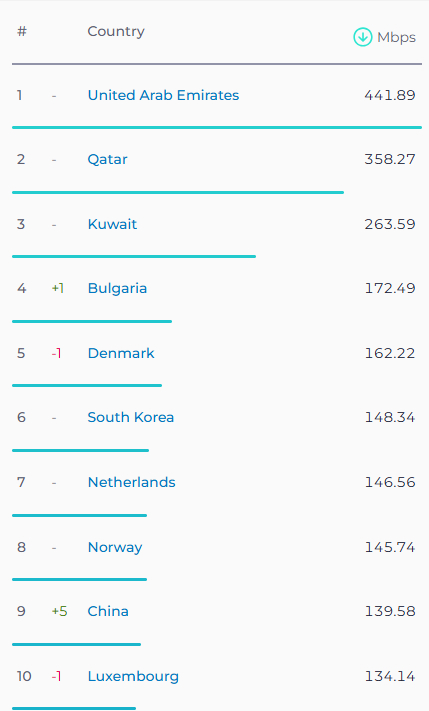
City Rankings:
- Osaka: Claiming the top spot in Japan with a median download speed of 73.95Mbps. This puts it in 76th globally, showcasing the technological prowess of this urban giant.
- Tokyo: Following closely behind in rank 84th, Tokyo boasts a median speed of 61.97Mbps, cementing its position as a major hub for high-speed mobile connectivity.
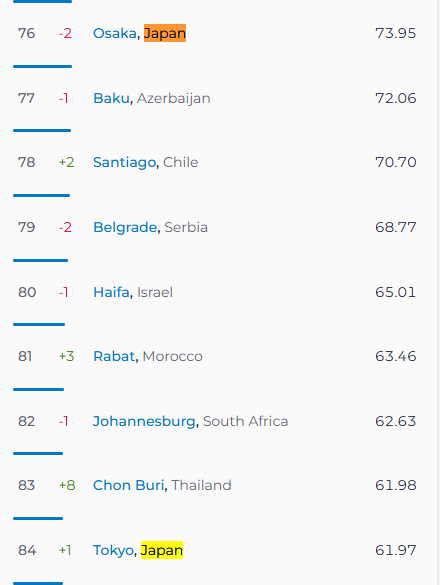
II. Mobile Internet in Japan: Connection Options for Tourists
Tourists have several options for mobile internet access, such as pocket WiFi, public WiFi, roaming, SIMs, and eSIM. The comparison table below provides an at-a-glance look to identify the best internet solution for your needs and destination.
| Option | Price Range (USD) | Pros | Cons |
| Free Wi-Fi | Free | Budget-friendly, widely available in major cities and tourist areas. | Unreliable connection speeds, limited coverage, security risks. |
| Pocket Wi-Fi | US$6 - US$18 per day | Strong and stable connection, shareable with multiple devices, convenient. | Expensive, need to carry another device, battery life limitations. |
| eSIM | US$8 - US$22 for 7 days US$9 - US$45 for 15 days US$10 - US$88 for 30 days | Easy to set up, convenient, keeps your original SIM active. | Not all phones support eSIM |
| SIM Card | $17 - $58 for 7 days | Affordable, use your own phone, various data packages available. | May need to switch SIM cards, not all phones compatible with Japanese SIMs. |
| Roaming | Varies by plan | No need for additional hardware or setup. Convenient for short trips or infrequent use | Can be very expensive, especially for data. May have speed restrictions or limited coverage |
Our recommendation: If traveling to Japan, use a local SIM for internet access, privacy, and affordable calls/texts. For supported devices, an eSIM is best due to no roaming fees, convenience, flexibility, continuous connectivity, easy setup, and future-proofing against technological changes.
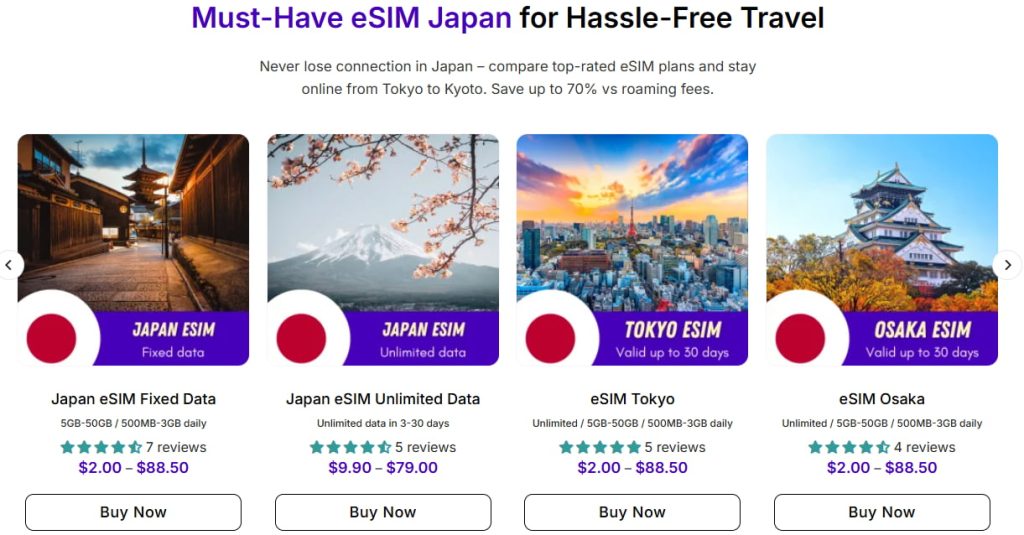
eSIM Japan offers a revolutionary way to stay connected during your Japanese adventure, with plans starting from just $2.00. Whether you’re exploring the neon-lit streets of Tokyo or the serene temples of Kyoto, their diverse range of plans includes fixed data (5GB-50GB), unlimited options, and city-specific coverage for key destinations like Tokyo, Osaka, Hokkaido, and Kyoto.
Key Features:
• Instant activation with QR code – get connected before landing
• Flexible plans from 3 to 30 days with daily or total data options
• High-speed 4G LTE coverage nationwide
• 24/7 WhatsApp customer support
• Multi-device sharing through hotspot feature
• City-specific plans for Tokyo, Osaka, Kyoto, and Hokkaido
• Multi-country options covering 11 Asian destinations
• No physical SIM card needed – just scan and connect
• Compatible with 200+ devices including latest iPhones, Samsung, and Google Pixels
• Up to 70% savings compared to traditional roaming fees
III. Mobile Internet Rates in Japan
The cost of 1GB of data in Japan is usually around $3 US dollars. This price can be different depending on the company and the plan.
- For prepaid SIM cards you only use for a short time, 1GB of data costs from about US$5-$15. The more data you get, the cheaper each gigabyte is. But these prices can change from deals and different companies.
- Long-term plans or contracts usually have a lower cost per GB. For these, 1GB costs around US$1 to $5. They give you more total data and a better price for each GB.
IV. Best Mobile Operators in Japan
After choosing the way for mobile internet in Japan, it’s time to talk about a list of Japanese mobile internet companies to compare options and make the best choice for your trip. Below is a comparison of the four main mobile carriers in Japan. Let’s take a look.
| Mobile Operator | Coverage | Price Range for SIM Card | Pros | Cons |
| AU/KDDI | Nationwide coverage | $15-40 | - Good network coverage throughout Japan- Wide range of plan options and add-ons | - Relatively higher prices for plans and SIM cards |
| NTT Docomo | Nationwide coverage | $20-50 | - Extensive coverage and high-quality network- Offers a variety of plans and optional services | - Can be more expensive compared to other providers |
| Rakuten | Nationwide coverage | $10-30 | - Competitive pricing and affordable plans- Flexibility to customize plans and select add-ons | - Network coverage may not be as extensive as some other providers |
| Softbank | Nationwide coverage | $15-40 | - Good network coverage and reliable service- Offers various plan options and discounts | - Some users report slower data speeds in certain areas |
V. FAQs
Does Japan have free public WiFi?
Limited public WiFi is available around train stations and tourist hotspots but lacks ubiquity and consistency. Speeds vary wildly and connections routinely time out, making reliance difficult. Free options work in a pinch but paid services deliver vastly better results.
Can I use GPS and Mapping data without mobile WiFi?
Downloaded offline Google Maps data and directions provide basic navigational aid without a live connection. But key functions like re-routing, traffic avoidance, and search require mobile data access not met through offline-only tools. Sightseeing efficiently greatly benefits from having local mobile signals.
How can I avoid expensive roaming charges from my cell provider?
Disable mobile data roaming entirely rather than just enabling Airplane mode. Under your phone Settings > Cellular/Mobile Network, turn off data roaming which prevents accidental background syncing that incurs high fees. Only connect via WiFi when abroad or use local SIM/rentals instead.
VI. Conclusions
Japan offers many convenient ways to stay connected and access its fast mobile networks. Savvy travelers skip costly roaming plans for affordable pocket WiFi rentals or local SIM cards. Compare top providers here to find the best option for your trip and focus on enjoying iconic sites without worrying about internet access.
